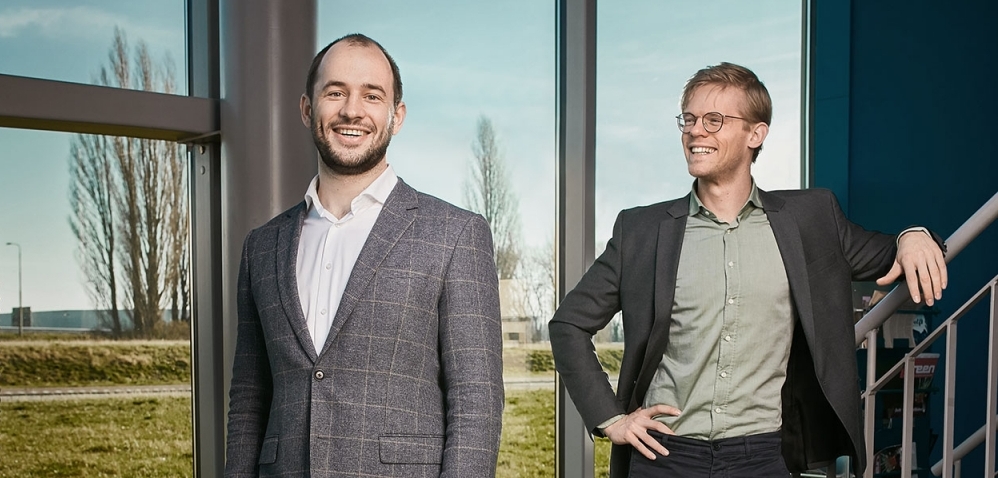The Delft start-up Physee has raised 1.5 million euros to accelerate the scaling-up of its PowerWindow and SmartWindow production.
Ferdinand Grapperhaus (left) and Willem Kesteloo are the founders of Physee. (Foto: Quote, Sjors Massar)
A clean-tech consortium of Dutch real-estate industry leaders is investing 1.5 million euros in tech company Physee. The investors are Daan van der Vorm (Vorm Ontwikkeling and board member of the Dutch Green Building Council), Coen van Oostrom (Edge Technologies), Job Dura (Dura Vermeer Group), the Van Veggel Family (Timeless Investments), and tech company builder and serial investor Dinko Valerio (CRXL).
Physee, a Delft University of Technology spin-off founded by Willem Kesteloo and Ferdinand Grapperhaus, has developed the PowerWindow and SmartWindow. These windows convert part of the light into electricity. The SmartWindow also generates data by sensing and analysing light intensity, temperature, humidity and air quality. Energy can be saved by connecting it to a climate control system.
Mission
According to Ferdinand Grapperhaus, Physee’s mission is to make buildings ‘comfortable intelligent power plants’. “This investment is an extremely important step towards this goal,” says Grapperhaus on the phone while at a Smart Cities New York conference. “It takes a lot of effort and capital to develop the hardware technology, so we actually need the capital to improve our technology to make buildings more comfortable and intelligent.We also need the right network to help distribute our technology. These real-estate industry leaders help us to further share our technology in the construction industry, which can be very conservative.”
Physee (a contraction of physics and seeing) will use the investment, firstly, to increase the windows’ efficiency by developing a coating able to harvest more sunlight. Secondly, it will reduce production costs by manufacturing its own solar cells. Thirdly, the tech company will increase its sales distribution potential. “During our innovation mission here in New York, we are looking for ways to make construction smarter and more sustainable without compromising the architectural design.”
Pilot
Several real estate projects have already been fitted with PowerWindows. The first large-scale pilot was the renovated head-office of the Rabobank in Eindhoven. The main goal of this pilot was to compare the south façade to the west façade of the building. “As expected, the south facing windows produced more electricity than the west facing windows. They produced about 8 Watt per square metre compared to 4 to 5 Watt per square metre,” says Grapperhaus.
The young entrepreneurs also learned how to install the windows, and how to meet customers’ expectations. “Rabobank had questions like: how much energy does the window generate; how much sunlight actually shines on it; and what is the temperature of the window,” says Grapperhaus. It made Physee realise that this information can be used to make buildings more energy efficient.
Sensor
The young company added sensors to its new product, SmartWindows. As a first step, an upgrade of the PowerWindow was installed at the Goede Doelen Loterij headquarters in Amsterdam. An app informs the users about the amount of energy generated and the temperature of the windows.
Physee was established in 2014 and subsequently won the Dutch start-up of the year award. It was Europe’s best energy start-up in 2015 and won the World Postcode Lottery Green Challenge (EUR 500k) in 2016. The company became a World Economic Forum Technology Pioneer in 2017.
Heb je een vraag of opmerking over dit artikel?
c.j.c.vanuffelen@tudelft.nl


Comments are closed.